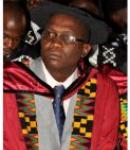
Mamadou Coulibaly 43 is the son of a civil servant and stay-at-home mother. He has five brothers and six sisters. Both parents encouraged him to study. His mother one of two wives had no education and did not understand what her children were studying. "She made sure we did our homework as soon as we got home from school even though she had never gone to school herself
he said. He became interested in seeds as a little kid and collected them including fruits crops and grasses. He dried them in the sun and planted them at the start of the next growing season "just to see what would happen. His parents encouraged him in agricultural studies just because he seemed to have a passion for it. He studied biological sciences in the Lycee in Mali received his bachelor's degree then left for Tunisia where he spent eight years. He received his undergraduate degree in agricultural sciences from the Ecole Suprieure d'Agriculture in Kef and then took an entrance exam that gave him a fellowship to the National Institute of Agronomy in Tunis where he spent four years. He learned about experimental farm techniques for building stress resistance in wheat hybrids in particular in relation to drought. "I learned good selection methods and started to find ways of bringing out the best in a plant " he said.In 1998 Mamadou returned to Mali where he began working on the country's sorghum program. His job was to help improve the yield of Mali's farmers throughout the country by encouraging them to adopt new hybrids. "The most important job was to integrate the farmers into the work I was doing. I spent a lot of time talking to them " said Mamadou who is married with three children. "I found that the farmers have the information that is vital to our success. We should never put a farmer's knowledge in the trash. It is worth gold. They know the earth they know the weather and they know the plant. In Mamadou's view farmers have to play an integral part of a country's agriculture strategy. "I came from the outside with my new knowledge and I had to earn their trust " he said. "It took about five or six years of work with the farmers throughout the country to introduce new hybrids but it had to be done with their input because they knew what would work and what would not. "Mali is a beautiful country with many fertile lands but we can't take advantage of them without the proper agricultural policies that will allow the land and the people to flourish. This is beginning to happen but it must not stop now. At the University of Ghana Legon he hopes to learn more efficient techniques for developing hybrids. Afterward he will return to Mali for a three-year project to apply the lessons from his studies. "With a good hybrid we can boost a yield three or four times " he said. "This can have a dramatic impact on the people of our country.
